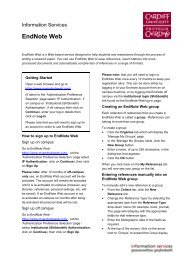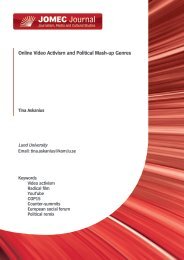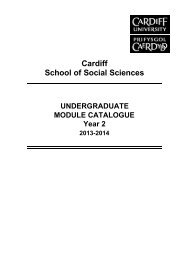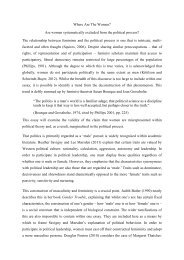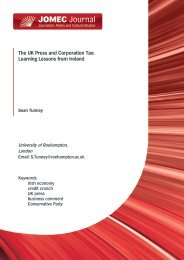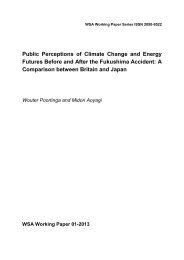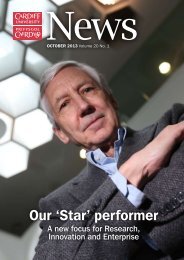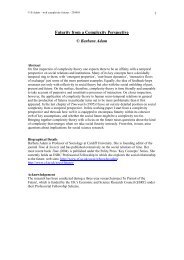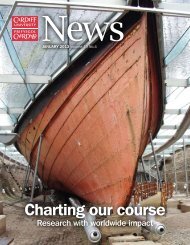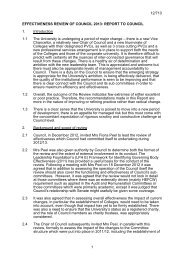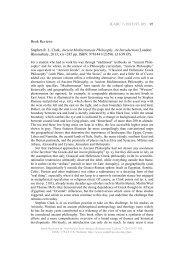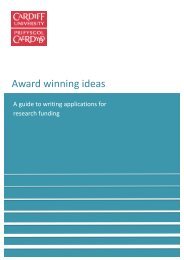APHRODITE IN PROCLUS' THEOLOGY - Cardiff University
APHRODITE IN PROCLUS' THEOLOGY - Cardiff University
APHRODITE IN PROCLUS' THEOLOGY - Cardiff University
You also want an ePaper? Increase the reach of your titles
YUMPU automatically turns print PDFs into web optimized ePapers that Google loves.
JLARC 3 (2009) 21-43 30<br />
the causes of the passionate and cognitive powers of humans as far as the subject<br />
of consideration is the composite of body and soul and the soul’s two lower, i. e.<br />
irrational, parts (the powers of the rational soul naturally depend on a higher place<br />
in the divine hierarchy). The moon, “the visible image of the source of nature,” is<br />
the cause of physical growth, the sun produces the totality of the sensations, and<br />
Hermes is the cause of the movements of the imagination (of the movements only,<br />
Proclus specifies, since “the cause of the fantastic faculty as such is Helios, since<br />
sensation and imagination form the same faculty”). Aphrodite produces the lustful<br />
desires of the lower irrational soul, Ares the movements of anger, depending on<br />
nature. Zeus produces vital powers universally, and Cronus, in the same manner,<br />
cognitive powers.<br />
The task of the planetary gods is to join the age period of the human being to the<br />
seven divine series. Proclus gives his most detailed description of this issue in his<br />
Commentary on Plato’s Alcibiades, 38 in a manner which corresponds, albeit with<br />
some strain, to the theory just outlined. “The third (period) is that which belongs<br />
to the series of Aphrodite as boys begin to produce sperm and set in motion the<br />
natural powers of child-making”. The role of Helios in this picture forces Proclus<br />
actually to identify the noon of life with the life epoch of a young man, and the<br />
agreement with the previously-mentioned theory in the Commentary on the Timaeus<br />
is not altogether successful, but unsurprising as far as the exegesis regards<br />
Aphrodite.<br />
Once more in the Commentary on the Timaeus Proclus returns to the question<br />
of Aphrodite and the desiring soul when he starts to deal with the structure of the<br />
human body. 39 This anatomical exegesis does not advance very far, because the<br />
manuscripts break off here. Proclus sets the planetary gods in connection with the<br />
human faculties referring to what “someone has said”. This expression implies perhaps<br />
a slightly reserved attitude to the theory that is expounded. The most interesting<br />
trait in this passage is that Proclus places Hermes as a discursive faculty between<br />
the thymos of Ares and the epithymetikon of Aphrodite. And how indeed could he<br />
do otherwise, seeing that he has to treat the divinities in their natural, planetary,<br />
order, going this time from top to bottom, from the sphere of the fixed stars to the<br />
level of the moon? He then continues establishing a correspondence between our<br />
pneumatic body with the sky and our mortal body with the sublunar world. But<br />
neither does this passage have anything surprising to say about Aphrodite.<br />
With respect to the theory of the body of the world, Proclus rejects the doctrine<br />
of correspondences between divinities and elements. 40 In this doctrine, which is<br />
Pythagorean according to Proclus, the element of Aphrodite is air. Proclus says<br />
that the Pythagoreans have the correct opinions insofar as they regard Aphrodite<br />
and Hermes as gathering and unifying divinities. Their doctrine of the elements<br />
38 Proclus, In Platonis Alcibiadem 1.196.2-19 ed. Alain Philippe Segonds, Proclus. Sur le premier<br />
Alcibade de Platon (Paris, 1985-1986).<br />
39 In Tim. 3.354,29-355,20.<br />
40 In Tim. 2.48,15-49, 12.<br />
Tuomo Lankila, ‘Aphrodite in Proclus’ Theology,’ in: Journal for Late Antique Religion and<br />
Culture 3 (2009) 21-43; ISSN: 1754-517X; Website: http://www.cardiff.ac.uk/clarc/jlarc



